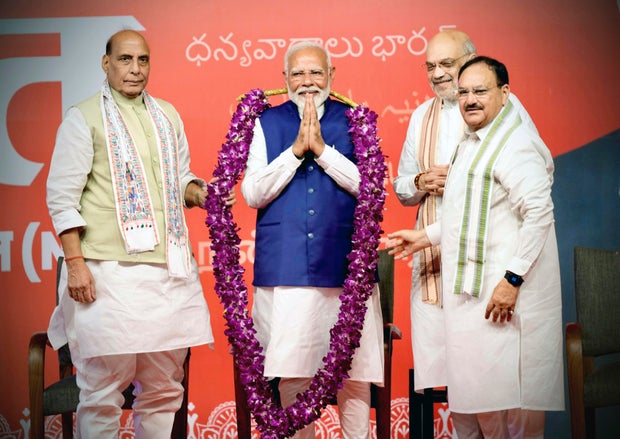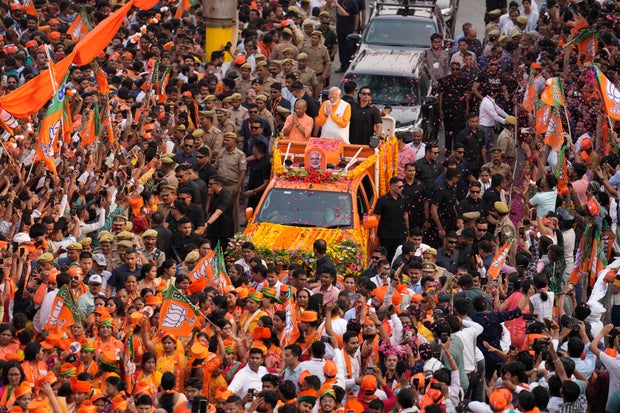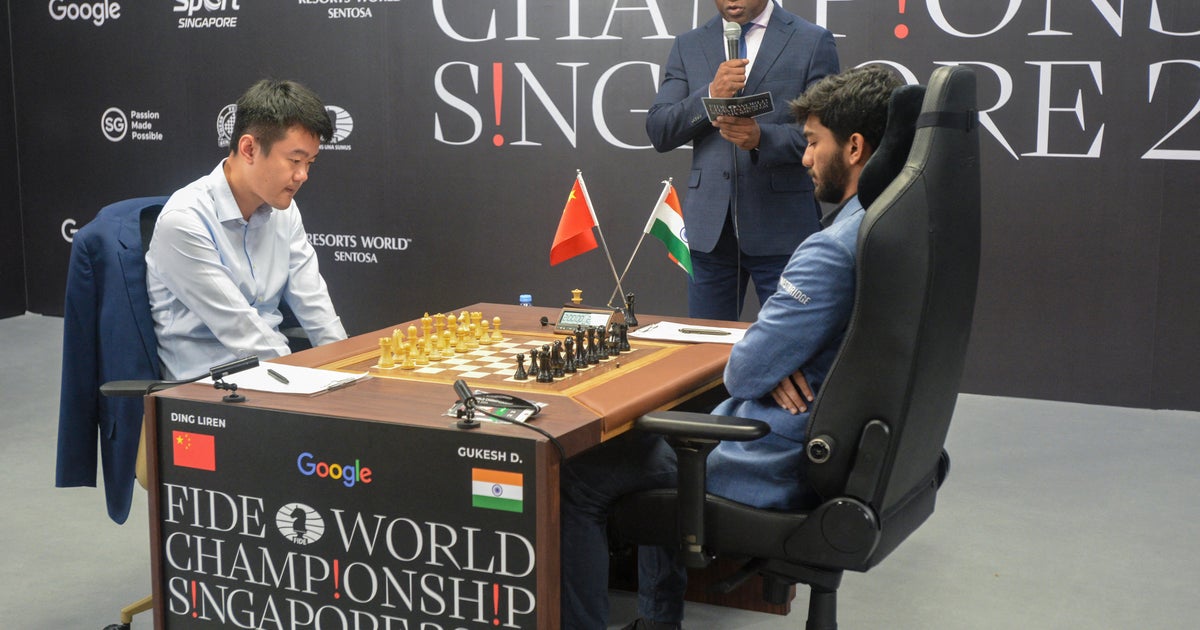CBS News
India’s Narendra Modi sworn in for third term as prime minister

India’s Prime Minister Narendra Modi took office for a third consecutive term on Sunday, but it may hold more challenges for the popular-but-polarizing leader than his past decade in power.
His Hindu nationalist Bharatiya Janata Party, which won by landslides in 2014 and 2019, failed to secure a majority to govern on its own this time, though his National Democratic Alliance coalition with the BJP and other parties won enough seats for a slim parliamentary majority.
Modi and his Cabinet members took the oath of office, administered by President Droupadi Murmu, at India’s presidential palace Rashtrapati Bhavan in New Delhi.
Needing support from his regional allies to maintain his power means Modi may have to adapt to a style of governance he has little experience with, or desire for.
Manish Swarup / AP
Modi, 73, is only the second Indian prime minister to win a third straight term. He has presided over a fast-growing economy while advancing Hindu nationalism.
To supporters, he is a larger-than-life figure who has improved India’s standing in the world, helped make its economy the world’s fifth-largest, and streamlined the country’s vast welfare program, which serves around 60% of the population. To some, he may even be more than human.
But to critics, he’s a cult leader who has eroded India’s democracy and advanced divisive politics targeting Muslims, who make up 14% of the country’s population. They say he has also increasingly wielded strong-arm tactics to subdue political opponents, squeeze independent media and quash dissent.
Modi’s government has rejected such accusations and says democracy is flourishing.
Political analysts say Modi’s victory was driven by social welfare programs that provided benefits from food to housing and by the strident Hindu nationalism that consolidated Hindu votes for his party. Hindus make up 80% of India’s population.
The economy is growing by 7% and more than 500 million Indians have opened bank accounts during Modi’s tenure, but that growth hasn’t created enough jobs, and inequality has worsened under his rule, according to some economists.
Modi began his election campaign promising to turn India into a developed country by 2047 and focused on highlighting his administration’s welfare policies and a robust digital infrastructure that have benefited millions of Indians.
But as the campaign progressed, he increasingly resorted to anti-Muslim rhetoric, calling them “infiltrators” and making references to a Hindu nationalist claim that Muslims were overtaking the Hindu population by having more children. Modi also accused the opposition of pandering to the minority community.
Conspicuous piety has long been a centerpiece of Modi’s brand, but he’s also begun suggesting that he was chosen by God.
“When my mother was alive, I used to believe that I was born biologically. After she passed away, upon reflecting on all my experiences, I was convinced that God had sent me,” he said in a TV interview during the campaign.
In January, he delivered on a longstanding Hindu-nationalist ambition by opening of a controversial temple on the site of a razed mosque.
Rajesh Kumar / AP
After campaigning ended, Modi went to a Hindu spiritual site for a televised 45-hour meditation retreat. Most Indian TV channels broadcast the event for hours.
Born in 1950 to a lower-caste family in western Gujarat state, as a young boy Modi joined the Rashtriya Swayamsevak Sangh, a paramilitary, right-wing group which has long been accused of stoking hatred against Muslims. RSS is the ideological parent of Modi’s BJP.
The tea seller’s son got his first big political break in 2001, becoming the state’s chief minister. A few months in, anti-Muslim riots ripped through the region, killing at least 1,000 people. There were suspicions that Modi quietly supported the riots, but he has denied the allegations.
In 2005, the U.S. revoked Modi’s visa, citing concerns that he did not act to stop the communal violence. An investigation approved by the Indian Supreme Court later absolved Modi, but the stain of the dark moment has lingered.
Thirteen years later, Modi led his Hindu nationalist party to a spectacular victory in the 2014 national elections after promising sweeping reforms to jumpstart India’s flagging economy.
But Modi’s critics and opponents say his Hindu-first politics have bred intolerance, hate speech and brazen attacks against minorities, especially Muslims, who make up 14% of India’s 1.4 billion people.
Months after securing a second term in 2019, his government revoked the special status of disputed Kashmir, the country’s only Muslim-majority state, and split it into two federally governed territories. His government passed a law that grants citizenship to religious minorities from Muslim countries in the region but excludes Muslims.
Decisions like these have made Modi hugely popular among his diehard supporters who hail him as the champion of the Hindu majority and see India emerging as a Hindu majoritarian state.
Modi has spent his political life capitalizing on religious tensions for political gain, said Christophe Jaffrelot, a political scientist and expert on Modi and the Hindu right. During his time as a state leader, he pioneered an embrace of Hindu nationalism unlike anything seen before in Indian politics.
“That style has remained. It was invented in Gujarat and today it is a national brand,” Jaffrelot said.
CBS News
Latest news on Nima Momeni’s verdict watch, Luigi Mangione’s extradition update

Watch CBS News
Be the first to know
Get browser notifications for breaking news, live events, and exclusive reporting.
CBS News
Nima Momeni found guilty in killing of Cash App founder Bob Lee

Nima Momeni has been found guilty of second degree murder in the fatal stabbing of Cash App founder Bob Lee, a verdict reached by a San Francisco jury after seven days of deliberations.
The verdict of second degree murder carries a 15 years to life sentence and includes an enhancement for using a knife in the crime. Momeni was found not guilty of the more serious charge of pre-meditated first degree murder.
Prosecutors Dane Reinstedt and Omid Talai were present in the courtroom for the verdict, as was Sgt. Brent Dittmer – who testified in the trial – and a handful of members of the DA’s office.
Defense attorneys Tony Brass and Zoe Aron were also present along with Nima’s mother Mahnaz Momeni.
Outside the courtroom, Lee’s brother Timothy Oliver Lee said the family was satisfied with the verdict.
“We we’re happy with the result today. We’re happy that Nima Momeni won’t be on the streets, no longer has the opportunity to harm anyone else in this world,” he said. “The verdict of murder two will put him away for a long time.”
Shocking murder
Momeni was accused of fatally stabbing tech executive Lee in a secluded part of San Francisco’s East Cut neighborhood under the Bay Bridge in April 2023.
Court officials announced late Monday afternoon that the jury had reached a verdict shortly before 4 p.m.
Prosecutors accused Momeni of stabbing Lee with a kitchen paring knife following a heated discussion regarding his sister’s relationship with Lee as well as their ongoing drug use. During the trial, Momeni’s lawyers claimed that their client acted in self-defense, alleging that Lee lunged at Momeni with a knife in his hand while high on ketamine and cocaine. The defense said Lee became erratic and aggressive after Momeni made a “bad joke” at the expense of Lee’s family.
Intense trial
The trial, which lasted six weeks, was punctuated by dramatic testimony, including an appearance on the stand of Momeni’s sister, Khazar Momeni. She testified as a witness for the prosecution and insisted during her first day of testimony that her brother didn’t kill Lee. She also detailed consuming several drugs with Lee and others in the days leading up to the fatal stabbing.
During cross examination by defense attorneys, Khazar Momeni described Lee as “all over the place” and “aggressive” while high on drugs. Her testimony was criticized outside the courtroom by Lee’s ex-wife Krista Lee, who accused her of trying to “make herself a victim.”
The testimony turned contentious when Nima Momeni took the stand, as the defendant sparred with the prosecution during cross-examination after earlier describing how Lee allegedly attacked him while his defense team questioned him about the confrontation.
Prosecutorial challenge
San Francisco Assistant District Attorney Omid Talai challenged Momeni’s version of the story and focused on his actions immediately after Lee’s death, including his calls to attorneys and text messages with his sister.
The case wrapped up in the first week of December with prosecutors trying to tear down Momeni’s defense in their closing arguments and asking why he didn’t call police or tell anyone about Lee allegedly attacking him.
The defense showed a bombshell video during their closing arguments, presenting surveillance footage they claimed showed Lee doing cocaine on the street outside a private club with the same knife used to kill him hours later. Defense attorney Saam Zangeneh used a cardboard cutout of the knife in court so the jury could see the size of the paring knife he said the video proved Lee had in his possession all along.
That video sparked a tense exchange between Zangeneh and Lee’s former wife, who let out a loud, mocking laugh as he showed the footage.
Zangeneh turned to directly address her, saying it wasn’t funny. Prosecutors quickly objected and the judge intervened to restore order in the courtroom.
The jury began deliberations on the morning of Dec. 4.
CBS News
Dec 17: CBS News 24/7, 10am ET

Watch CBS News
Be the first to know
Get browser notifications for breaking news, live events, and exclusive reporting.









